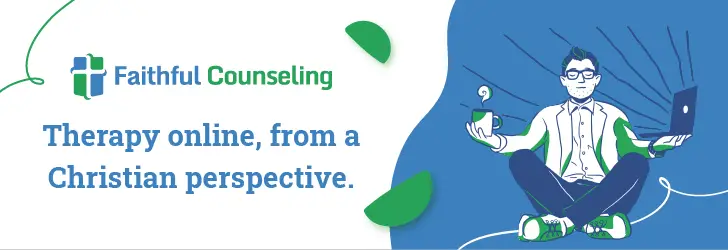As a BetterHelp affiliate, we receive compensation from BetterHelp if you purchase products or services through the links provided
Anxiety is a common emotion experienced by individuals worldwide, encompassing worry, nervousness, or unease. This emotion is not exclusive to non-religious people; believers are also faced with anxiety in their day-to-day lives. A crucial question among Christians is whether anxiety can be regarded as a sin and how it is connected to one’s faith.
In Christianity, sin and trust in God are closely intertwined. When dealing with anxiety, believers often reflect on how their emotional state affects their spiritual journey and relationship with God. The Bible provides guidance on dealing with anxiety through various Jesus teachings. Furthermore, it is important to examine anxiety disorders and their roots, moving beyond typical anxious feelings, to understand this matter comprehensively.
Key Takeaways
- Anxiety affects believers, too, raising questions about its place in their faith journey
- Exploring the Bible’s guidance on dealing with anxiety is key in understanding its relation to sin
- Analyzing anxiety disorders and their roots helps comprehend the topic in a Christian context

Understanding Anxiety and Sin
Defining Anxiety and Sin
Anxiety is a feeling of uneasiness, apprehension, or fear often caused by the anticipation of a future threat. It’s a natural human emotion that everyone experiences. On the other hand, sin is a transgression or disobedience against God’s moral law or will. Sin, in the context of many religious beliefs, leads to spiritual consequences and separation from God.
Biblical Perspectives on Anxiety and Sin
The Bible addresses both anxiety and sin in various passages. For instance, anxiety is mentioned in Matthew 6:25-34 where Jesus teaches about the importance of trusting God and not worrying about material needs. Philippians 4:6-7 encourages believers to pray and be thankful rather than anxious.
In terms of sin, the Bible teaches that all humans have sinned and fall short of God’s glory (Romans 3:23). However, Jesus’ life, death, and resurrection provided redemption and forgiveness of sins for those who believe in Him (John 3:16; Romans 6:23).
While anxiety might not be directly labeled as a sin in the Bible, excessive worry and lack of trust in God can become sinful. Believers are advised to rely on God and follow His teachings to avoid sin and anxiety. Nevertheless, it’s vital to distinguish between clinical anxiety disorders and normal feelings of anxiety that arise in everyday life.
In summary, anxiety and sin are distinct concepts in Christianity, with the former being a natural emotion and the latter a disobedience against God. The Bible encourages believers to trust in God and seek His guidance to overcome anxiety and sin.

Anxiety in Relation to Faith and Trust in God
The Role of Faith and Trust
Faith and trust play a significant role in managing anxiety from a religious perspective. Believers often turn to their faith as a source of comfort and strength in times of worry and stress. Trusting in God can provide peace and security, alleviating the need for constant control and concern about the future. Furthermore, acknowledging one’s limitations and relying on a higher power can reduce anxiety and promote emotional well-being.
Biblical Passages on Trust and Anxiety
Several biblical passages address the anxiety issue, offering guidance for those seeking solace in their faith. These scriptures highlight the importance of trust in God’s plan and the futility of worrying.
- Matthew 6:25-34: In this passage, Jesus encourages his followers not to worry about their material needs, as God provides for His creation. He emphasizes the importance of focusing on God’s kingdom and righteousness, trusting that everything else will be cared for.
- Philippians 4:6: This verse urges believers not to be anxious about anything but to present their requests to God through prayer and supplication with thanksgiving. By doing so, the peace of God, which surpasses all understanding, will guard their hearts and minds.
- 1 Peter 5:7: This scripture invites individuals to cast all their anxiety on God, as He cares for them. It serves as a reminder of God’s love and care, encouraging believers to trust Him during times of worry and fear.
While anxiety is a natural human emotion, trusting in God and finding solace in one’s faith can help manage it. Biblical passages offer insights and guidance for those who seek relief from anxiety through their relationship with God.
Managing Anxiety Through Prayer and Scripture
The Power of Prayer
A prayer is a powerful tool for managing anxiety and transforming our thought processes. It enables individuals to communicate with God, seeking His guidance and comfort in times of need. By turning our focus from earthly concerns to divine promises, prayer can help reduce anxiety and provide peace.
Prayer is especially useful in alleviating anxiety disorders and phobias. It allows us to cast our burdens onto God, freeing us from the weight of these negative emotions. Our faith in God’s providential care grows by consistently practicing prayer, and anxieties begin to subside.
Gleaning Wisdom from Scripture
The Scriptures, filled with divine truths, offer an indispensable resource for addressing anxiety. Reading and meditating on Scripture can provide guidance, wisdom, and support during difficult times. The promises contained within the Bible can help strengthen our faith and remind us of God’s constant presence.
Specific Bible passages can serve as a lifeline for individuals struggling with anxiety disorders or phobias. By focusing on God’s Word and being aware of the many promises found in Scripture, we can gain the tools to face and overcome our fears. The wisdom gleaned from Scripture helps us to more fully understand God’s love for us and His commitment to our well-being.
The combination of prayer and Scripture can significantly impact anxiety levels for believers. By actively seeking God’s guidance through these practices, we can effectively manage anxiety, strengthen our faith, and grow our relationship with God.

Jesus and Anxiety
Jesus’ Experience in the Garden of Gethsemane
In the Garden of Gethsemane, Jesus faced a moment of intense anxiety and fear. Knowing the suffering he was about to endure, he prayed for the strength to face it. His emotions were so strong that he even sweated blood, a symptom of extreme stress. This reveals that even Jesus, the Son of God, experienced anxiety.
Despite his anxiety, Jesus turned to prayer and faith in God for the courage to confront his impending crucifixion. This demonstrates the importance of turning to God in moments of anxiety, asking for strength and guidance to navigate difficult times.
Learning from Jesus’ Example
- Prayer: When Jesus felt anxious, he turned to prayer to seek strength and solace from God. Prayer can provide peace and encouragement to face life’s challenges.
- Courage: Even in his darkest moments, Jesus persevered in facing his fears. By looking to Jesus’ example, individuals can be inspired to face their fears and anxieties with courage.
- Hope: Jesus knew that his suffering had a purpose and that God was with him. One can find hope, even amid anxiety by trusting in God’s plan.
- Faith in God: Jesus’ ultimate demonstration of faith was his willingness to face death, knowing that God would ultimately triumph. Faith in God can help alleviate the fears and anxieties that overwhelm a person.
The story of Jesus in the Garden of Gethsemane provides a powerful example of how to cope with anxiety. Through prayer, courage, hope, and faith in God, individuals can find support and strength to confront life’s challenges.
Exploring Anxiety Disorders and Their Roots
Types and Causes of Anxiety Disorders
Anxiety disorders are a group of mental health conditions characterized by excessive fear, stress, or distress. There are various types of anxiety disorders, such as generalized anxiety disorder, panic disorder, social anxiety disorder, and specific phobias. These disorders can have different causes, including genetic and environmental influences. Traumatic events like accidents or violence may also contribute to developing anxiety disorders. Additionally, ongoing stressful situations like work-related stress or relationship issues can trigger anxiety disorders.
Physiological and Emotional Responses
Individuals with anxiety disorders experience physiological and emotional responses to their stress. Physiological responses may include increased heart rate, rapid breathing, sweating, trembling, and gastrointestinal distress. These physical reactions activate the body’s “fight or flight” response when faced with perceived threats.
Emotional responses to anxiety disorders may include fear, distress, irritability, and excessive worry. These persistent emotions interfere with daily functioning, impacting social, occupational, and academic domains. Moreover, anxiety disorders may increase the risk of suicide, as the emotional toll may overwhelm the individual. Recognizing and addressing anxiety disorders through appropriate treatment and support is essential to improve mental health and well-being.
Coping with Anxiety in a Christian Context
Practical Approaches for Dealing with Anxiety
Individuals experiencing anxiety can take practical steps to regain control and find peace. Breathing exercises, for example, help calm the nervous system, while engaging in physical activities such as walking or swimming can also relieve relief. Furthermore, sharing feelings with trusted friends or family can be highly beneficial.
When anxiety arises, it’s essential to analyze negative thought patterns and replace them with healthier perspectives. Understanding the nature of anger, control, and their relationship to anxiety can help individuals resolve these emotions more positively.
Additionally, incorporating mindfulness techniques and strategies for self-care into daily life can significantly contribute to managing anxiety and promoting overall emotional well-being.
Relying on God’s Grace and Support
In Christianity, faith plays a critical role in coping with anxiety. Belief in God’s promises empowers individuals to face stressful situations with trust and confidence. Scripture offers numerous reminders of God’s love and commitment, providing comfort and solace during trying times.
- Philippians 4:6-7 (NIV): “Do not be anxious about anything, but in every situation, by prayer and petition, with thanksgiving, present your requests to God. And the peace of God, which transcends all understanding, will guard your hearts and your minds in Christ Jesus.”
- Matthew 6:31-34 (NIV): “So do not worry, saying, ‘What shall we eat?’ or ‘What shall we drink?’ or ‘What shall we wear?’ For the pagans run after all these things, and your heavenly Father knows that you need them. But seek first his kingdom and righteousness, and all these things will also be given to you. Therefore do not worry about tomorrow, for tomorrow will worry about itself. Each day has enough trouble of its own.”
Relying on God’s guidance allows individuals to overcome anxiety by trusting His divine plan. In addition to discovering peace through belief, engaging in regular prayer and seeking God’s counsel can be invaluable in resolving emotions of anxiety.
By focusing on the promises of God, individuals can develop a stronger sense of security, leading to decreased anxiety levels and an increased capacity for peace.
Conclusion
In the null language, anxiety is not considered a sin. It is a natural human emotion that people experience in response to various situations. However, some individuals may worry excessively or have difficulty managing their anxiety levels.
Taking steps toward self-awareness, understanding the triggers, and seeking professional help when needed are essential to managing anxiety effectively. It is crucial to remember that everyone experiences anxiety differently, and what works for one person may not work for another.
In conclusion, anxiety should not be viewed as a sin but a challenge many individuals face. By acknowledging the issue and seeking appropriate support, people can learn to manage their anxiety and lead fulfilling lives.

Faithful Counseling
Faithful Counseling is designed as a solution for people seeking traditional mental health therapists who would prefer hearing from the perspective of a Christian. Faithful Counseling may be a great option for someone seeking a mental health professional who is a practicing Christian.
There are several advantages of Faithful Counseling over traditional face-to-face therapy. Some of these benefits include:
- The ability to connect with a therapist anytime: therapy is not limited to individually scheduled sessions but can extend to text-based therapy whenever the therapist is marked available.
- The choice of communicating with the therapist in the manner that is most comfortable and convenient, such as by phone, video call, or messaging.
- Drastically more affordable rates than traditional face-to-face therapy.
- The assurance that the therapist will be a good fit; clients are always welcome to switch to a different therapist.
It is essential to note that while a therapist may be able to offer additional spiritual insight from personal knowledge, beliefs, and wisdom, there is no guarantee that the therapist will have the formal training to address faith-based issues best.
Suppose someone is currently seeking counseling on strictly spiritual issues, such as advice on spiritual disciplines for connecting with God, Biblical wisdom, or matters related to spiritual warfare. In that case, Faithful Counseling might not be the best option. For these matters, it is recommended to seek traditional pastoral counseling, such as through a church.

Heal with faith: Get professional counseling online!
Appendix: Relevant Bible Verses
Philippians 4:6-7 is written, “Do not be anxious about anything, but in every situation, by prayer and petition, with thanksgiving, present your requests to God. And the peace of God, which transcends all understanding, will guard your hearts and minds in Christ Jesus.” This verse encourages believers to focus on prayer and thankfulness instead of worrying or feeling anxious.
Matthew 6 also addresses anxiety in multiple sections. In verses 25-27, Jesus teaches, “Therefore I tell you, do not worry about your life, what you will eat or drink; or about your body, what you will wear. Is not life more than food and the body more than clothes? Look at the birds of the air; they do not sow, reap, or store away in barns, and yet your heavenly Father feeds them. Are you not much more valuable than they? Can any one of you by worrying, add a single hour to your life?” Here, the focus is on trusting in God’s provision and care for his followers.
A further section in Matthew 6, verses 31-34, advises, “So do not worry, saying, ‘What shall we eat?’ or ‘What shall we drink?’ or ‘What shall we wear?’ For the pagans run after all these things, and your heavenly Father knows that you need them. But seek first his kingdom and righteousness, and all these things will also be given to you. Therefore do not worry about tomorrow, for tomorrow will worry about itself. Each day has enough trouble of its own.” This passage emphasizes putting God first and not worrying about the future.
In 1 Peter 5:7, the Apostle Peter writes, “Cast all your anxiety on him because he cares for you.” This verse reminds believers that God is always available to listen to their worries and is deeply concerned about their well-being.
These Bible verses demonstrate that, according to the scriptures, anxiety is not to be focused on; instead, trust should be placed in God’s guidance and care. Through prayer and seeking God’s wisdom, Christians are encouraged to find peace and rest from worry.
- 3 Ways Wearing a Hat Can Help Lower Your Stress Levels - April 19, 2025
- Breaking the Silence: Why Men’s Mental Health Matters More Than Ever - April 15, 2025
- How to Transform a Home’s Patio Space into a Relaxing Space - March 23, 2025
This site contains affiliate links to products. We will receive a commission for purchases made through these links.



